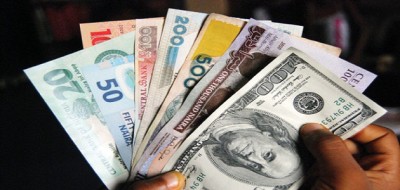Despite seeming iron clad position of the Central Bank of Nigeria, CBN, backed by both the presidency and the newly inaugurated minister of Finance, Mrs. Kemi Adeosun, the short and medium term outlook of the foreign exchange, forex, market points to significant decline in the value of Naira.
In the One month forward contract last weekend one US Dollar was quoted at N202.20, down from N201.57 while three month contract was N212.10, down from N208.58. The six month contract depreciated week-on-week to N222.18, down from N216.94 while 12 month contract showed a depreciation to N230.11, down from N228.76.Vanguard investigations last week show that most Forex Forward Contracts at the over-the-counter, OTC, market segment puts US Dollar to Naira rate at steady depreciation. Forex or currency forward contract is a binding contract in the foreign exchange market that locks in the exchange rate for the purchase or sale of a currency on a future date. It is essentially a hedging tool that does not involve any upfront payment.
The depreciation recorded in the forward contract was coming even at the backdrop of a slight appreciation in the value of Naira against US Dollar in the CBN-managed currency market segment closing the week at N198.53/ USD1.00 as against N198.76/ USD1.00 in the previous week. CBN clearing rate and interbank rate closed stable at N197/USD and N199.10/USD respectively.
Financial analysts at Cowry Asset Management Limited, a Lagos based financial investment house, who corroborated this development linked it to the fallout of the strict enforcement of the requirements of Bank Verification Number, BVN, in transactions at the bureau de changes, BDCs.
In their research report on the market they stated “this week, we expect the Naira to continue to slide against the dollar at the parallel market segment due to supply shortage occassioned by the implementation of BVN”. Also another financial sector investment house, Afrinvest Group, last weekend indicated that Naira value would be facing significant bashing in the weeks ahead.
According to them “analysis of activities in the forwards market shows traders are pricing the Naira within the range of N225.00 and N230.00 (1-year forward) as Naira is still believed not to be trading at its true value” apparently referring to the CBN-managed valuation in the official market segment. At the parallel market last Friday, Naira continued to depreciate against the dollar, trading for as high as N232.00/USD1.00.
Concluding on its forex market report for last week Afrinvest said, “the increasing activity in the parallel market has been attributed to the full execution of the BVN requirement for financial transactions. “Operators at the BDC have complained to the apex bank that the requirement for the provision of a customer’s BVN before executing a forex transaction has driven a lot of customers to the parallel market due to fears of their accounts being used for malicious activities.
“The reduction in activity at the BDC has left the operators with large volumes of unsold foreign currencies. “The BDC operators have called on the apex Bank to extend the already passed deadline for the compliance on the use of the BVN. We do not expect the CBN to reverse its stance on the use of BVN for FX transactions and expect the currency to trend at current level next week”.
Reacting to the alleged fears in using BVN at the BDCs Director, Corporate Communications Department of CBN, Alhaji Ibrahim Muazu wondered why anybody should be afraid of submitting BVN for transactions, adding that there was no threat in giving BVN for foreign exchange transactions.
Muazu had told Vanguard previous week that “this probably has to do with people with illicit flows, and not for fear of the BVN itself. And for people with illicit flows, they are avoiding documentation, the way they avoid the banks. “To us, if not for the likely impact on the black market, it is a good development because it means the foreign exchange market is now demand driven. For example, if you go to the banks for ‘Form A’ foreign exchange transactions, it requires more than the BVN.
Submitting BVN for transactions is not a security threat. The BDCs cannot access the account details of their customers; they would just have the BVN for reporting purposes. “The BVN is just an identity; the BDC cannot see your account details. It is just like asking you to submit your passport photograph. And the purpose is to make sure that people don’t buy foreign exchange above the limit allowed by the law.
There is a limit of $4,000 per individual per quarter. If one person buys $4,000 from one BDC, and another $4,000 from another BDC, there is no way anybody can verify it is the same person. All these things are supposed to be controlled by the BVN. All we want to clarify is that there is no threat in giving your BVN, it is an identity, in as much as you can give your passport photograph or even utility bills, as required for operation of dormant account.
“It is unfortunate if they are going to the black market and the black market does not have enough supply; but for us if they don’t buy from the CBN, if the CBN dollar is not sold, it would come back to us or there would be no demand for dollars next week, and this means we are conserving reserves. The only problem is the funding source for the black market will be limited and the price is high. But if I can give my BVN and buy dollars, maybe at N200, why should I go to black market and buy at N250? So the genuineness of the transaction is clear.”
END


Be the first to comment